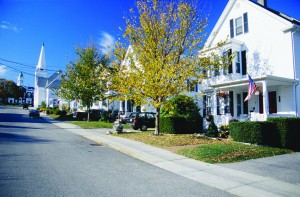 What’s the most important thing when buying a house? Some say price. Some say location. Some say the home itself. There is an argument to be made, however, that the most important thing is actually the neighborhood.
What’s the most important thing when buying a house? Some say price. Some say location. Some say the home itself. There is an argument to be made, however, that the most important thing is actually the neighborhood.
Not every community is right for every person, so you’ll want to carefully consider what you want in your neighborhood. Do you want easy access to local restaurants, bars and shops? Or, do you want to live in an area with larger homes where people take care of their yards and spend the weekends gardening? These aren’t your only two options, but you’ll want to carefully consider your needs and desires before scouting potential neighborhoods.
When you have some neighborhoods in mind, be sure to visit several times at different times of the day. In the mornings and evenings, you can observe traffic patterns and see how easy it is to get around. During the day, particularly on weekends, you can see if people are out and about, taking care of their homes, or if they are holed up inside. You might discover that the home you thought was quiet is near a racetrack and you’ll be dealing with noise every weekend in the summer. You can’t find out this information from just one visit, and it’s worth your time to investigate.
If you have children, of course, you’ll want to consider the quality of the local schools and the general safety of the neighborhoods. You should also consider access to local parks, community centers or other activities for kids.
Talking to local business owners about the neighborhood is a great idea. They can give you a perspective that you can’t get from local homeowners, potentially alerting you to changes in the commercial structure of the neighborhood, a new big-box store coming in, problems with vacant businesses or a thriving retail district.
Be sure to check out the public services that are offered. With public revenues declining, many municipalities are cutting back on important public services like police, libraries and parks. Check the public space to see if they have had to cut back recently and check the paper for recent news and any information about what’s happening that could affect the local economy. Local crime statistics are often available on the Web, and you can check to see what general trends are in your chosen neighborhood.
If you are not buying your retirement home, you might want to think about the resale value of the home and how that relates to the surrounding neighborhood. Neighborhoods that have been resilient in tough times and not ballooned in boom times are more likely to hold their value. You can also think about maintaining access to the best of all worlds – a little privacy, a little community spirit, a little retail – in order to cast your resale net as wide as possible.
There are a lot of things that you can’t tell about neighborhood until you are out in it, and the last thing you want is to find out that you’ve just signed your name to a 30-year mortgage in a neighborhood you just can’t stand. Home buying is too intensive to make that kind of mistake.
By Sam Erickson MultiAd

